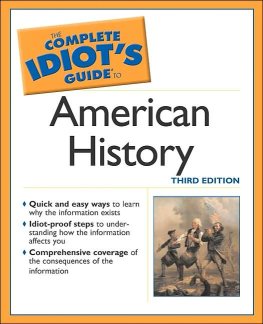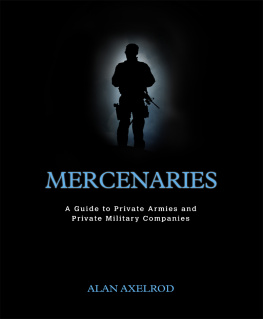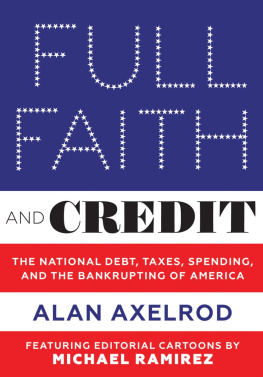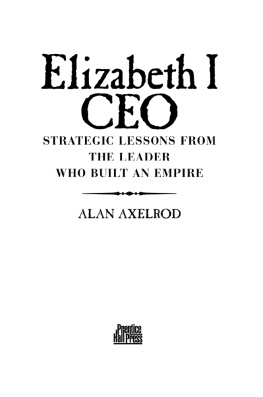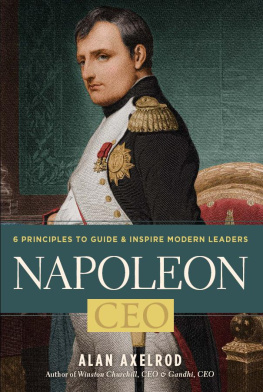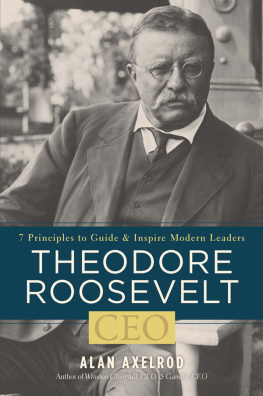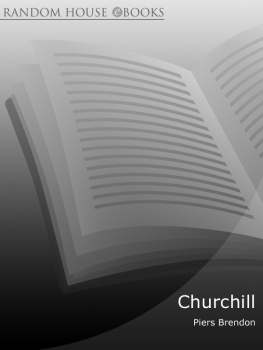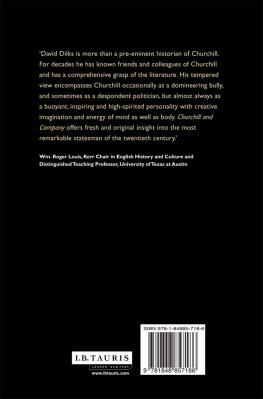WINSTON
CHURCHILL,
CEO

WINSTON
CHURCHILL,
CEO

25 LESSONS
FOR BOLD BUSINESS LEADERS
ALAN AXELROD

New York / London
www.sterlingpublishing.com
STERLING and the distinctive Sterling logo are registered trademarks of Sterling Publishing Co., Inc.
Library of Congress Cataloging-in-Publication Data
Axelrod, Alan, 1922
Winston Churchill, CEO : 25 lessons for bold business leaders/Alan Axelrod.
p. cm.
Includes bibliographical references and index.
ISBN 978-1-4027-5805-8 (alk. paper)
1. Leadership. 2. Ability. 3. Decision making. 4. Churchill, Winston S. (Winston Spencer), 1940-1. Title.
HD57.7.A967 2009
10 9 8 7 6 5 4 3 2 1
Published by Sterling Publishing Co., Inc.
387 Park Avenue South, New York, NY 10016
Copyright 2009 Alan Axelrod
Distributed in Canada by Sterling Publishing
c/o Canadian Manda Group, 165 Dufferin Street
Toronto, Ontario, Canada M6K 3H6
Distributed in the United Kingdom by GMC Distribution Services
Castle Place, 166 High Street, Lewes, East Sussex, England BN7 1XU
Distributed in Australia by Capricorn Link (Australia) Pty. Ltd.
P.O. Box 704, Windsor, NSW 2756, Australia
Book design and layout: Adam B. Bohannon
Manufactured in the United States
All rights reserved
Sterling ISBN 978-1-4027-5805-8
978-1-4027-7099-9 (export edition)
For information about custom editions, special sales, premium and corporate purchases, please contact Sterling Special Sales Department at 800-805-5489 or specialsales@sterlingpublishing.com.
FRONTISPIECE: Prime Minister Winston Churchill walking the deck of the HMS Prince of Wales during the Atlantic Conference, October 9, 1941. Courtesy the Library of Congress Prints & Photographs Division, LC-DIG-ppmsca-05407.
For Anita, always
I also hope that I sometimes suggested to the lion the right place to use his claws.
~Speech to both Houses of Parliament,
Westminster Hall,
on the occasion of his eightieth birthday,
November 30, 1954
CONTENTS
Nothing in life is so exhilarating as to be shot at without result.
I pass with relief from the tossing sea of Cause and Theory to the firm ground of Result and Fact.
It is better to be making the news than taking it; to be an actor rather than a critic.
You will make all kinds of mistakes; but as long as you are generous and true, and also fierce, you cannot hurt the world.
The maxim of the British people is Business as usual.
Change is the master key. A man can wear out a particular part of his mind by continually using it and tiring it, just in the same way as he can wear out the elbows of his coat.
One ought to be just before one is generous.
We would rather see London laid in ruins and ashes than that it should be tamely and abjectly enslaved.
Never give in, never give in, never, never, never, neverin nothing, great or small, large or pettynever give in except to convictions of honour and good sense.
The flying peril is not a peril from which one can fly. We cannot possibly retreat. We cannot move London.
Nothing is more dangerous... than to live in the temperamental atmosphere of a Gallup Poll, always feeling ones pulse and taking ones temperature.
Dictators ride to and fro upon tigers which they dare not dismount. And the tigers are getting hungry.
I cannot forecast to you the action of Russia. It is a riddle wrapped in a mystery inside an enigma.
I have nothing to offer but blood, toil, tears, and sweat.
There are men in the world who derive as stern an exaltation from the proximity of disaster and ruin, as others from success.
We are waiting for the long-promised invasion. So are the fishes.
The British nation is unique in this respect. They are the only people who like to be told how bad things are, who like to be told the worst.
Let us... so bear ourselves that if the British Empire and its Commonwealth last for a thousand years, men will still say: This was their finest hour.
You do your worstand we will do our best.
Do not let us speak of darker days; let us speak rather of sterner days. These are not dark days: these are great daysthe greatest days our country has ever lived; and we must all thank God that we have been allowed... to play a part in making these days memorable in the history of our race.
Now this is not the end. It is not even the beginning of the end. But it is, perhaps, the end of the beginning.
The V sign is the symbol of unconquerable will.
At lastweve gotten together.Franklin D. Roosevelt, welcoming Churchill aboard USS Augusta, August 9, 1941 We have,Churchill (nodding), in reply
The message of the sunset is sadness; the message of the dawn is hope.
Victory, victory at all costs, victory in spite of all terror, victory however long and hard the road may be; for without victory there is no survival.
WINSTON
CHURCHILL,
CEO
Introduction
A Leaders Life
From the beginning, his greatest urgehis greatest needwas to be at the center of the action. This fact is not in itself sufficient to explain Winston Churchill, but Winston Churchill cannot be explained without understanding this fact. He was born on November 30, 1874, in a bedroom of Blenheim Palace, the familys magnificent seat in Woodstock, Oxfordshire. That he entered the world two months premature was a fitting prelude to a life lived in perpetual impatience to make upon that world one indelible mark after another. When, as a twenty-three-year-old cavalry subaltern (second lieutenant) in 1898, he prevailed on the senior-most officer in the British army, Lord Horatio Kitchener, to accept him for service in his Nile River Campaign, Churchills fellow junior officers denounced him as super-precocious and insufferably bumptious. He was, in fact, much more than that. Not content with a mere army career, he also wrote newspaper dispatches from the front lines of Britains colonial wars, and his firsthand account of an expedition against a rebellious Pashtun tribe in Malakand (now part of Pakistan), The Story of the Malakand Field Force (1898), published just before he left India to join Kitcheners campaign in North Africa, was a sensational bestseller. Literary critics also called it precocious, but they meant this in the best sense of the word, because the book exhibited the narrative skill and historical authority of a much more mature author. In no small part, this effect was the result of the authors writing about the conduct of the senior officers of the field force as if he had been their commander, and that did little to endear Churchill to the many officers he portrayed.
Not that their opinions much mattered to him. A premature baby, Winston grew into a premature historian and a premature general. It was, as it were, only natural.
Next page

